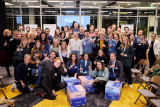Dear expert,
In February I will start with my master thesis. Even though I have gained a lot of knowledge in academia about sustainability-related topics, I would now like to hear from YOU, the real experts in 'the field' which topics according to you are insufficiently explored and deserve more attention?
What is according to you missing in current studies, e.g. translation from academia to practice?
Rather than simply producing a thesis to conclude my masters I want to really contribute by creating something that is useful for practice and can make a change. Hence, your knowledge, expertise and potential examples of interesting cases/projects are very welcome!





In my view MaaS will only be able to take off in NL once there is countrywide fare integration in PT, a shift from subsidising PT companies to incentives to users and a reversal of the policy where cost-recovery in PT is more important than societal benefits. Would be great to have this thesis studied.
Anything concerned with greening cities and buildings can get more interest, this includes the soil. Just two days ago we had a site visit of a new industrial zone and it was surprising to many how much possibilities were still left unexplored.
When we apply for building permits, we have to be able to prove the quality of the solutions we use. Often this means material and installation certifications, embedded values in calculation programs (like for the epc/ BENG, GreenCalc+, MPG, sound and thermal insulation, etc, etc, etc.). Also, the use of BIM and other engineering programs encourages the use of pre-set solutions. Because setting up your own element or calculation from scratch takes a lot of time investment. Time nobody is prepared to pay for. Also, to use all these (very expensive) programs we need more and more specialists. Now with BENG even certified ones. Making every step more and more expensive. Especially if you want something out of the standard.
So I think you can imagine the hight of the threshold (which is rising every day more and more) for all new, experimental and also for re-used non-standiserd solutions. We have become so hyper "efficient" in status-quo solutions that we are suffocating our societal ability to change with agility.